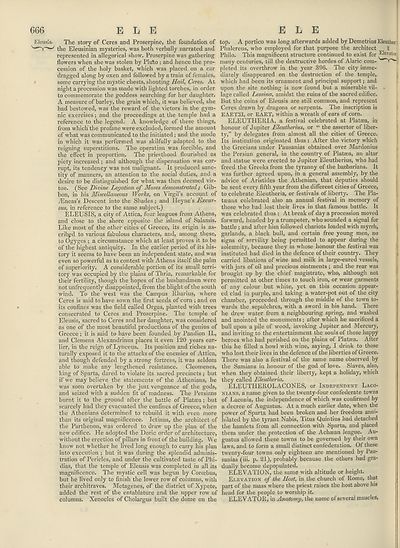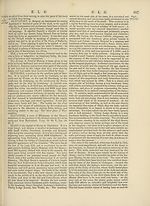Encyclopaedia Britannica > Volume 8, DIA-England
(676) Page 666
Download files
Complete book:
Individual page:
Thumbnail gallery: Grid view | List view

6(36 E L E E L E
Eleusis. The story of Ceres and Proserpine, the foundation of
the Eleusinian mysteries, was both verbally narrated and
represented in allegorical show. Proserpine was gathering
flowers when she was stolen by Pluto ; and hence the pro¬
cession of the holy basket, which was placed on a car
dragged along by oxen and followed by a train of females,
some carrying the mystic chests, shouting Hail, Ceres. At
night a procession was made with lighted torches, in order
to commemorate the goddess searching for her daughter.
A measure of barley, the grain which, it was believed, she
had bestowed, was the reward of the victors in the gym-
nic exercises; and the proceedings at the temple had a
reference to the legend. A knowledge of these things,
from which the profane were excluded, formed the amount
of what was communicated to the initiated; and the mode
in which it was performed was skilfully adapted to the
reigning superstitions. The operation was forcible, and
the effect in proportion. The priesthood flourished as
piety increased; and although the dispensation was cor¬
rupt, its tendency was not malignant. It produced sanc¬
tity of manners, an attention to the social duties, and a
desire to be distinguished for what was then deemed vir¬
tue. (See Divine Legation of Moses demonstrated; Gib¬
bon, in his Miscellaneous Works, on Virgil’s account of
^Eneas’s Descent into the Shades; and Heyne’s Excur¬
sus, in reference to the same subject.)
ELEUSIS, a city of Attica, four leagues from Athens,
and close to the shore opposite the island of Salamis.
Like most of the other cities of Greece, its origin is as¬
cribed to various fabulous characters, and, among these,
to Ogyges ; a circumstance which at least proves it to be
of the highest antiquity. In the earlier period of its his¬
tory it seems to have been an independent state, and was
even so powerful as to contest with Athens itself the palm
of superiority. A considerable portion of its small terri-
tory was occupied by the plains of Thria, remarkable for
their fertility, though the hopes of the husbandmen were
not unfrequently disappointed, from the blight of the south
wind. To the west was the Campus Rharius, where
Ceres is said to have sown the first seeds of corn ; and on
its confines was the field called Orgas, planted with trees
consecrated to Ceres and Proserpine. The temple of
Eleusis, sacred to Ceres and her daughter, was considered
as one of the most beautiful productions of the genius of
Greece; it is said to have been founded by Pandion II.,
and Clemens Alexandrinus places it even 120 years ear¬
lier, in the reign of Lynceus. Its position and riches na¬
turally exposed it to the attacks of the enemies of Attica,
and though defended by a strong fortress, it was seldom
able to make any lengthened resistance. Cleomenes,
king of Sparta, dared to violate its sacred precincts ; but
if we may believe the statements of the Athenians, he
was soon overtaken by the just vengeance of the gods,
and seized with a sudden fit of madness. The Persians
burnt it to the ground after the battle of Plataea; but
scarcely had they evacuated the confines of Greece, when
the Athenians determined to rebuild it with even more
than its original magnificence. Ictinus, the architect of
the Parthenon, was ordered to draw up the plan of the
new edifice. He adopted the Doric order of architecture,
without the erection of pillars in front of the building. We
know not whether he lived long enough to carry his plan
into execution ; but it was during the splendid adminis¬
tration of Pericles, and under the cultivated taste of Phi¬
dias, that the temple of Eleusis was completed in all its
magnificence. The mystic cell was begun by Corcebus,
but he lived only to finish the lower row of columns, with
their architraves. Metagenes, of the district of Xypete,
added the rest of the entablature and the upper row of
columns. Xenocles of Cholargus built the dome on the
top. A portico was long afterwards added by Demetrius Eleuther
Phalereus, who employed for that purpose the architect , II
Philo. This magnificent structure continued to exist for -^kvatot
many centuries, till the destructive hordes of Alaric com-
pleted its overthrow in the year 396. The city imme¬
diately disappeared on the destruction of the temple,
which had been its ornament and principal support; and
upon the site nothing is now found but a miserable vil¬
lage called Lessina, amidst the ruins of the sacred edifice.
But the coins of Eleusis are still common, and represent
Ceres drawn by dragons or serpents. The inscription is
EAET2I, or EAET, within a wreath of ears of corn.
ELEUTHERIA, a festival celebrated at Platsea, in
honour of Jupiter Eleutherius, or “ the assertor of liber¬
ty,” by delegates from almost all the cities of Greece.
Its institution originated thus ; After the victory which
the Grecians under Pausanias obtained over Mardonius
the Persian general, in the country of Plataea, an altar
and statue were erected to Jupiter Eleutherius, who had
freed the Greeks from the tyranny of the barbarians. It
was further agreed upon, ih a general assembly, by the
advice of Aristides the Athenian, that deputies should
be sent every fifth year from the different cities of Greece,
to celebrate Eleutheria, or festivals of liberty. The Pla-
tmans celebrated also an annual festival in memory of
those who had lost their lives in that famous battle. It
was celebrated thus : At break of day a procession moved
forward, headed by a trumpeter, who sounded a signal for
battle ; and after him followed chariots loaded with myrrh,
garlands, a black bull, and certain free young men, no
signs of servility being permitted to appear during the
solemnity, because they in whose honour the festival was
instituted had died in the defence of their country. They
carried libations of wine and milk in large-eared vessels,
with jars of oil and precious ointments ; and the rear was
brought up by the chief magistrate, who, although not
permitted at other times to touch iron, or wear garments
of any colour but white, yet on this occasion appear¬
ed clad in purple, and taking a water-pot out of the city
chamber, proceeded through the middle of the town to¬
wards the sepulchres, with a sword in his hand. There
he drew water from a neighbouring spring, and wrashed
and anointed the monuments; after which he sacrificed a
bull upon a pile of wood, invoking Jupiter and Mercury,
and inviting to the entertainment the souls of those happy
heroes who had perished on the plains of Plataea. Alter
this he filled a bowl with wine, saying, I drink to those
who lost their lives in the defence of the liberties of Greece.
There was also a festival of the same name observed by
the Samians in honour of the god of love. Slaves, also,
when they obtained their liberty, kept a holiday, which
they called Eleutheria.
ELEUTHEROLACONES, or Independent Laco¬
nians, a name given to the twenty-four confederate towns
of Laconia, the independence of which was confirmed by
a decree of Augustus. At a much earlier date, when the
power of Sparta had been broken and her freedom anni¬
hilated by the tyrant Nabis, Titus Quintius had detached
the hamlets from all connection with Sparta, and placed
them under the protection of the Achaean league. Au¬
gustus allowed these towns to be governed by their own
laws, and to form a small distinct confederation. Of these
twenty-four towns only eighteen are mentioned by Pau¬
sanias (iii. p. 21), probably because the others had gra¬
dually become depopulated.
ELEVATION, the same with altitude or height.
Elevation of the Host, in the church of Rome, that
part of the mass where the priest raises the host above his
head for the people to worship it.
ELEVATOR, in Anatomy, the name of several muscles,
Eleusis. The story of Ceres and Proserpine, the foundation of
the Eleusinian mysteries, was both verbally narrated and
represented in allegorical show. Proserpine was gathering
flowers when she was stolen by Pluto ; and hence the pro¬
cession of the holy basket, which was placed on a car
dragged along by oxen and followed by a train of females,
some carrying the mystic chests, shouting Hail, Ceres. At
night a procession was made with lighted torches, in order
to commemorate the goddess searching for her daughter.
A measure of barley, the grain which, it was believed, she
had bestowed, was the reward of the victors in the gym-
nic exercises; and the proceedings at the temple had a
reference to the legend. A knowledge of these things,
from which the profane were excluded, formed the amount
of what was communicated to the initiated; and the mode
in which it was performed was skilfully adapted to the
reigning superstitions. The operation was forcible, and
the effect in proportion. The priesthood flourished as
piety increased; and although the dispensation was cor¬
rupt, its tendency was not malignant. It produced sanc¬
tity of manners, an attention to the social duties, and a
desire to be distinguished for what was then deemed vir¬
tue. (See Divine Legation of Moses demonstrated; Gib¬
bon, in his Miscellaneous Works, on Virgil’s account of
^Eneas’s Descent into the Shades; and Heyne’s Excur¬
sus, in reference to the same subject.)
ELEUSIS, a city of Attica, four leagues from Athens,
and close to the shore opposite the island of Salamis.
Like most of the other cities of Greece, its origin is as¬
cribed to various fabulous characters, and, among these,
to Ogyges ; a circumstance which at least proves it to be
of the highest antiquity. In the earlier period of its his¬
tory it seems to have been an independent state, and was
even so powerful as to contest with Athens itself the palm
of superiority. A considerable portion of its small terri-
tory was occupied by the plains of Thria, remarkable for
their fertility, though the hopes of the husbandmen were
not unfrequently disappointed, from the blight of the south
wind. To the west was the Campus Rharius, where
Ceres is said to have sown the first seeds of corn ; and on
its confines was the field called Orgas, planted with trees
consecrated to Ceres and Proserpine. The temple of
Eleusis, sacred to Ceres and her daughter, was considered
as one of the most beautiful productions of the genius of
Greece; it is said to have been founded by Pandion II.,
and Clemens Alexandrinus places it even 120 years ear¬
lier, in the reign of Lynceus. Its position and riches na¬
turally exposed it to the attacks of the enemies of Attica,
and though defended by a strong fortress, it was seldom
able to make any lengthened resistance. Cleomenes,
king of Sparta, dared to violate its sacred precincts ; but
if we may believe the statements of the Athenians, he
was soon overtaken by the just vengeance of the gods,
and seized with a sudden fit of madness. The Persians
burnt it to the ground after the battle of Plataea; but
scarcely had they evacuated the confines of Greece, when
the Athenians determined to rebuild it with even more
than its original magnificence. Ictinus, the architect of
the Parthenon, was ordered to draw up the plan of the
new edifice. He adopted the Doric order of architecture,
without the erection of pillars in front of the building. We
know not whether he lived long enough to carry his plan
into execution ; but it was during the splendid adminis¬
tration of Pericles, and under the cultivated taste of Phi¬
dias, that the temple of Eleusis was completed in all its
magnificence. The mystic cell was begun by Corcebus,
but he lived only to finish the lower row of columns, with
their architraves. Metagenes, of the district of Xypete,
added the rest of the entablature and the upper row of
columns. Xenocles of Cholargus built the dome on the
top. A portico was long afterwards added by Demetrius Eleuther
Phalereus, who employed for that purpose the architect , II
Philo. This magnificent structure continued to exist for -^kvatot
many centuries, till the destructive hordes of Alaric com-
pleted its overthrow in the year 396. The city imme¬
diately disappeared on the destruction of the temple,
which had been its ornament and principal support; and
upon the site nothing is now found but a miserable vil¬
lage called Lessina, amidst the ruins of the sacred edifice.
But the coins of Eleusis are still common, and represent
Ceres drawn by dragons or serpents. The inscription is
EAET2I, or EAET, within a wreath of ears of corn.
ELEUTHERIA, a festival celebrated at Platsea, in
honour of Jupiter Eleutherius, or “ the assertor of liber¬
ty,” by delegates from almost all the cities of Greece.
Its institution originated thus ; After the victory which
the Grecians under Pausanias obtained over Mardonius
the Persian general, in the country of Plataea, an altar
and statue were erected to Jupiter Eleutherius, who had
freed the Greeks from the tyranny of the barbarians. It
was further agreed upon, ih a general assembly, by the
advice of Aristides the Athenian, that deputies should
be sent every fifth year from the different cities of Greece,
to celebrate Eleutheria, or festivals of liberty. The Pla-
tmans celebrated also an annual festival in memory of
those who had lost their lives in that famous battle. It
was celebrated thus : At break of day a procession moved
forward, headed by a trumpeter, who sounded a signal for
battle ; and after him followed chariots loaded with myrrh,
garlands, a black bull, and certain free young men, no
signs of servility being permitted to appear during the
solemnity, because they in whose honour the festival was
instituted had died in the defence of their country. They
carried libations of wine and milk in large-eared vessels,
with jars of oil and precious ointments ; and the rear was
brought up by the chief magistrate, who, although not
permitted at other times to touch iron, or wear garments
of any colour but white, yet on this occasion appear¬
ed clad in purple, and taking a water-pot out of the city
chamber, proceeded through the middle of the town to¬
wards the sepulchres, with a sword in his hand. There
he drew water from a neighbouring spring, and wrashed
and anointed the monuments; after which he sacrificed a
bull upon a pile of wood, invoking Jupiter and Mercury,
and inviting to the entertainment the souls of those happy
heroes who had perished on the plains of Plataea. Alter
this he filled a bowl with wine, saying, I drink to those
who lost their lives in the defence of the liberties of Greece.
There was also a festival of the same name observed by
the Samians in honour of the god of love. Slaves, also,
when they obtained their liberty, kept a holiday, which
they called Eleutheria.
ELEUTHEROLACONES, or Independent Laco¬
nians, a name given to the twenty-four confederate towns
of Laconia, the independence of which was confirmed by
a decree of Augustus. At a much earlier date, when the
power of Sparta had been broken and her freedom anni¬
hilated by the tyrant Nabis, Titus Quintius had detached
the hamlets from all connection with Sparta, and placed
them under the protection of the Achaean league. Au¬
gustus allowed these towns to be governed by their own
laws, and to form a small distinct confederation. Of these
twenty-four towns only eighteen are mentioned by Pau¬
sanias (iii. p. 21), probably because the others had gra¬
dually become depopulated.
ELEVATION, the same with altitude or height.
Elevation of the Host, in the church of Rome, that
part of the mass where the priest raises the host above his
head for the people to worship it.
ELEVATOR, in Anatomy, the name of several muscles,
Set display mode to:
![]() Universal Viewer |
Universal Viewer | ![]() Mirador |
Large image | Transcription
Mirador |
Large image | Transcription
Images and transcriptions on this page, including medium image downloads, may be used under the Creative Commons Attribution 4.0 International Licence unless otherwise stated. ![]()
| Encyclopaedia Britannica > Encyclopaedia Britannica > Volume 8, DIA-England > (676) Page 666 |
|---|
| Permanent URL | https://digital.nls.uk/193331793 |
|---|
| Attribution and copyright: |
|
|---|
| Description | Ten editions of 'Encyclopaedia Britannica', issued from 1768-1903, in 231 volumes. Originally issued in 100 weekly parts (3 volumes) between 1768 and 1771 by publishers: Colin Macfarquhar and Andrew Bell (Edinburgh); editor: William Smellie: engraver: Andrew Bell. Expanded editions in the 19th century featured more volumes and contributions from leading experts in their fields. Managed and published in Edinburgh up to the 9th edition (25 volumes, from 1875-1889); the 10th edition (1902-1903) re-issued the 9th edition, with 11 supplementary volumes. |
|---|---|
| Additional NLS resources: |
|

